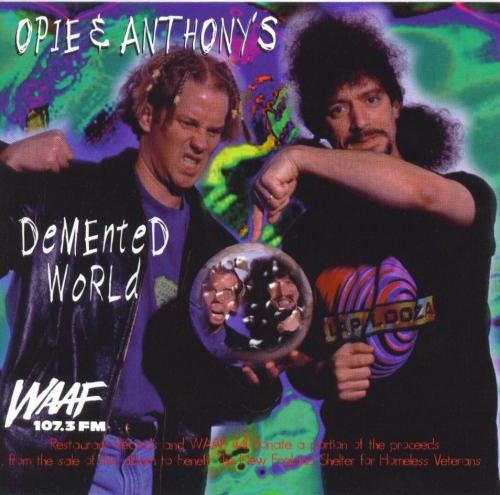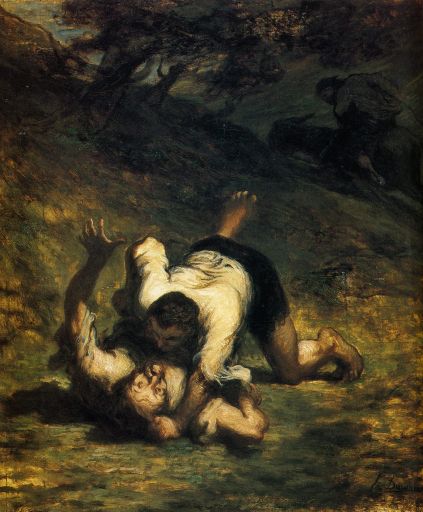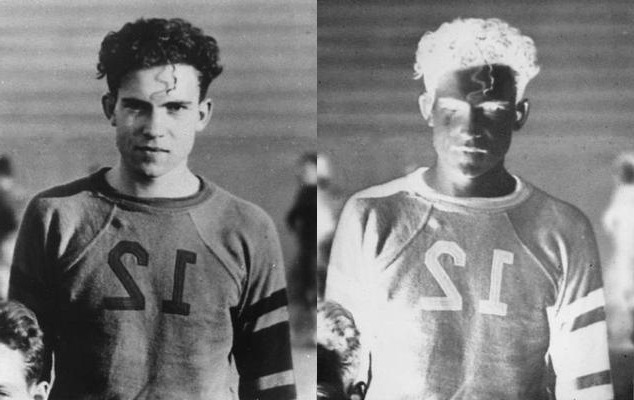 This is a 1997 CD by shock jock duo Opie and Anthony, containing clips from their WAAF show in Boston.
This is a 1997 CD by shock jock duo Opie and Anthony, containing clips from their WAAF show in Boston.
At their best, O&A had a sense of nastiness and cruelty that was cathartic. Opie once said that he didn’t give a fuck if guests on the show cried, all he cared about was the ticking clock on the wall. He had to fill four hours per day with funny material, and if you weren’t entertaining, he’d make you entertaining, god save your soul. Countless guests fell prey to that clock. They’d screw up, get slow and boring, and then the knives would come out. Whether you were a Hollywood A-lister or a no-name author with a book to promote, Opie and Anthony had one law. “Bring us food, or become food yourself.”
…But that was at their peak (2005). In 1997, they were mostly doing stupid fucking hack (they themselves admit it. As they grew more sophisticated, they spent a lot of hours riffing on their WAAF era). “100 Grand” pretty much sets the tone. An eye-rollingly fake prank call where they trick some guy into thinking he won $100,000. The big reveal: he actually won a 100 Grand candy bar. Hahaha! KERR-RAY-ZEE!!!
Sometimes its nostalgic, in a rotary telephone kind of way. This kind of radio was almost like the internet before there was an internet: sliced-up, rapidly consumable “content kibble” that can be enjoyed with little thought or effort. Sometimes its just embarassing and cringeworthy. All you can say about early O&A is that, by the standards of the time, they were not an exceptionally bad radio show.
Let’s talk about the term “shock jock”. In computer programming, it’s usually bad practice to name files “new” or “latest”. The code will eventually become obsolete, you’ll probably forget to change the name, and soon you’ll have a file called LATEST-NEW-UPDATED25314.c that was created during the K-T extinction event and has been replaced ten times.
Likewise, it’s probably a bad idea to call yourself “shocking”. The waterline of shock rises higher each year, and a person raised on the internet will only be “shocked” to the extent that this stuff was once considered edgy. Prank calls. Parody songs. Bra bombing. How old would you have to be to find this stuff offensive? Are there even that many years on a calendar?
Opie’s voice is disturbingly different – he sounds like he’s been huffing helium. Anthony is far quicker and more energetic than he is now – firing off lines like rabbit punches instead of drawling them out. This is years before meaty-breasted third mic Jim Norton entered the picture, and you really feel his absence. All those little pauses really cry to have Jim filling them with lines.
It’s fascinating relic for the hardcore O&A fan. But honestly, nearly everything O&A did in their “classic” period is unlistenable in 2016. Partly it’s the lack of Jim. Partly it’s the FCC’s jackboot on their neck (this stuff should be way filthier than it is). Mostly it’s just that 1997 was twenty years ago, and that zany 90s vibe now seem like transmissions from a distant planet.
Although a modern day O&A fan will hardly recognise the b-b-boys, it’s an interesting look back at the days when radio was ruled by Howard Stern. Speaking of obsolete terms, here’s another one…”the king of all media.”
 “Never put a period where God has put a comma” – Ross Douthat
“Never put a period where God has put a comma” – Ross Douthat
“Back in the year 960, Christian missionaries invaded Scandinavia and threatened the Vikings: if you persist in your pagan customs you will end up in hell where eternal fires burn. The Vikings welcomed the good news. They trembled from cold, not fear.” – Eduardo Galeano
“They proved that if you quit smoking, it will prolong your life. What they haven’t proved is that a prolonged life is a good thing” – Bill Hicks
“Secondly, what unites the liberals attempting to demonise Bruenig – Sady Doyle, Joshua Foust, Jordan Kay, and others you’re probably very lucky to have never heard of – is their total uselessness at good, vicious political invective. It’s just not their natural terrain. […] Case in point is Doyle, who once wrote that ‘trying to parse Hillary Clinton without also parsing Hillary hate is like trying to drink water without touching the glass,’ apparently having never heard of the popular invention known as a ‘straw.’” – Sam Kriss
“It is not from the benevolence of the butcher, the brewer, or the baker that we expect our dinner, but from their regard to their own interest.” – Adam Smith
“The real tragedy of the poor is the poverty of their aspirations.” – Adam Smith
“Fascism no longer exists. It’s as dead as Odinism. You can reinvent Odinism, but it’s not Odinism, it’s fake Odinism. Unless it’s a joke (and don’t get me wrong, Nazi Microsoft chatbots are funny), it’s pathetic. Actually, the fact that /pol has made Hitler funny is the best possible evidence that Hitler is completely dead. What’s alive is the ideological system that defeated fascism — which committed plenty of atrocities of its own. Of our own. When we think about crimes from the last century, it seems more relevant to think about the crimes we committed, not those they committed.” – Curtis Yarvin/Mencius Moldbug
“No Vietcong ever called me a nigger.” – Muhammad Ali
“Space echoes like an immense tomb, yet the stars still burn. Why does the sun take so long to die?” – Nick Land
 April 22 1993. The 37th President of the United State, Richard Milhous Nixon, passed away. He was carried by motorcade to the Richard Nixon Presidential Library, was then buried Yorba Linda, a suburban city in Orange County, California. You might be thinking this is boring and useless information. You’re right. It is.
April 22 1993. The 37th President of the United State, Richard Milhous Nixon, passed away. He was carried by motorcade to the Richard Nixon Presidential Library, was then buried Yorba Linda, a suburban city in Orange County, California. You might be thinking this is boring and useless information. You’re right. It is.
What’s interesting is that he was buried within a few feet of the place he was born, giving his life an almost palindromic quality. From birth to death, his planetary displacement was almost zero.
“Almost palindromic” describes many things about Nixon. His surname isn’t a palindrome, but it clearly wants to be. Five letters. An N at beginning and end. A pivotal X in the middle. Vowels in the spaces between. “Nixon” means “Son of Nicholas”, and “Nicholas” contracts to “Nick”, evocative of how “Richard” contracts to “Rick.”
He was born on January 1913. If he’d been born a few months later or died a few months earlier, he would have been exactly eighty years old. Eighty is a nice, symmetrical number, easy to derive as a product and palindromic in base 3(22223), 6(2126), and 9 (889.)
The situation is almost poetic, which is to say, it’s truly and deeply aggravating. I can handle the universe not making sense. What I can’t handle is when the universe almost makes sense…and then doesn’t. It’s as infuriating as a basketball shot that scrapes the rim and misses.
Imagine a more poetic and elegant universe, where Nixon/Noxin’s life truly was a palindrome: the second half a reversal of the first half.
Let’s call 1952 the midway point. Nixon was suffering the first major scandal of his career: an investigation on the misuse of Republican party funds. He looked uncomfortable, and guilty. Some women have resting bitch face. Nixon had resting guilt face. The poor guy could have said “I’m the devil” and make everyone wonder what he was really hiding.
During the speech, he told an awkward anecdote about a black-and-white dog called Checkers.
In my universe, Nixon closes those guilty eyes, the universe crunches and inverts like the X in his name…and Noxin opens them. And begins to talk.
“…As it happens, I also own a white-and-black cat called Chess.”
From there, the rest of his life plays out like falling dominoes. Or perhaps someone re-setting dominoes that have already fallen.
1954: expelled from the US Senate.
1960: fails to win California’s 12th congressional district against a Democrat challenger. Tragically loses his daughter in an unexplained accident. Noxin feels nothing. Whatever grief a man would normally feel is expressed only in negatives.
1960: returns to military service in the US Navy.
1962: War. Massive US deployment of soldiers in Vietnam. The Cuban Missile Crisis occurs – the United States enters DEFCON 2. Noxin is now part of a new form of war: one that might see nobody surviving to be a winner or a loser – a war fought by the hawks of plutonium and uranium, with humanity as their inept and feeble falconer.
1965: The Tet Offensive overruns key US positions. Vietnamization is failing, and detente is no longer possible. Behind the Iron Curtain, the USSR marshalls its strength like Zeus gathering up thunderbolts.
1966: While overseas, Noxin realises that his wife Pat has left him. He doesn’t understand why, but he also doesn’t understand why he married in the first place. It seems like something that happened to a different person.
1968: all storms break. Europe is under attack. The nukes start to fly. Noxin serves, until the point where he doesn’t. He doesn’t need to see Germany or Poland get taken, added to the Soviet urheimat. He wants to see the rot take hold in his own country. He arranges an honorable discharge, and returns to law.
1973: Noxin watches as the US implodes inwards. This is fundamentally satisfying for him. The stock market crashes. Nuclear fallout terminates the bread basket forever.
1993: Noxin returns to his place of birth, his life a blind-ended worm: no differentiation possible between one end or the other. Then he’s buried in Yorba Linda. The last men of the United States shovel irradiated dirt into this second womb.
 This is a 1997 CD by shock jock duo Opie and Anthony, containing clips from their WAAF show in Boston.
This is a 1997 CD by shock jock duo Opie and Anthony, containing clips from their WAAF show in Boston.

